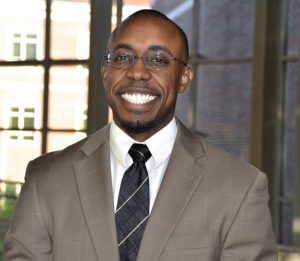Darryl Dickerson, an assistant professor in the Department of Mechanical and Materials Engineering, is about to complete his first year as a Panther, having joined FIU in August 2019. He was drawn to the school because of its focus on both research and student success. “FIU is a high research institution,” he says. “At the same time, there is an emphasis on student success at all levels. That was part of my goal, to be part of a great intellectual environment while also working to ensure that students come in and have experiences that propel them to success.”

Dickerson didn’t come straight to engineering. As a high school student, he was actually set on being a physician. Talented in many areas, including math and science, one of his teachers told him he should consider pursuing engineering as a major due to his knack for the area. This idea was strengthened by the outreach efforts of visitors from the National Society of Black Engineers doing outreach. “I wanted to find ways to impact health, but I realized I could do that in a number of different ways.”
Today, Dickerson works on addressing underlying problems within health and medicine and figuring out new technologies for human health challenges. Current research projects include creating models to better understand the critical structures that produce function of tissues and developing materials for complex tissue engineering.
One of the earliest things Dickerson did after coming to FIU was to join the Faculty Mentor Program (FMP). “FMP was highly recommended to me, both from within the department by folks I trust and value and from outside the department by people I’ve known for a long time. I figured that much positive feedback must mean there’s something to it.”
Mentors and mentees are matched based on research interests and disciplinary demands, and come from different departments in the respective college, which Dickerson appreciates. “Mentorship is important, especially when you’re in a new place. It’s helpful to understand how to navigate from someone who’s been there a while. It’s easy to become insulated in our departments, so an outside perspective is very helpful.”
Mentors and mentees are matched at the beginning of the academic year, and a variety of workshops and events are hosted or co-hosted by the Office to Advance Women, Equity & Diversity. This loose but structured program has helped Dickerson establish a strong relationship with his mentor, Anthony McGoron, a professor of biomedical engineering and associate dean for academic affairs at the College of Engineering and Computing.
“When you want to discuss things like long-term and short-term goals, you have to start with an initial conversation about where things stand. It helped to be able to have those conversations early on,” Dickerson says. Early meetings can help mentees establish realistic goals about what can be accomplished during the year.
Mentors and mentees are encouraged to set up meetings with each other throughout the year, so that mentees like Dickerson have numerous opportunities to ask questions or get advice. There are many circumstances in which a new professor can benefit from the advice of someone from a senior level. “You may not be connected to everything and everyone yet at the university, so you can ask what opportunities to look out for. There’s a lot of flexibility around what you can do and how you spend your time, so can you ask whether you’re focusing on the right things.”
As beneficial as this specific feedback is, Dickerson believes there’s even more value to mentoring. “Your mentor provides perspective. This perspective comes from someone who has had experience in different areas. It ultimately helps you better understand who you are and what you want to be.”
Dickerson credits FMP with helping to ease his first year at FIU and is looking forward to the day when he joins FMP as a mentor. “I believe it’s important to be able to provide guidance. Right now, I’m working on mentoring students. I hope to one day have the experience to guide another faculty member.”
